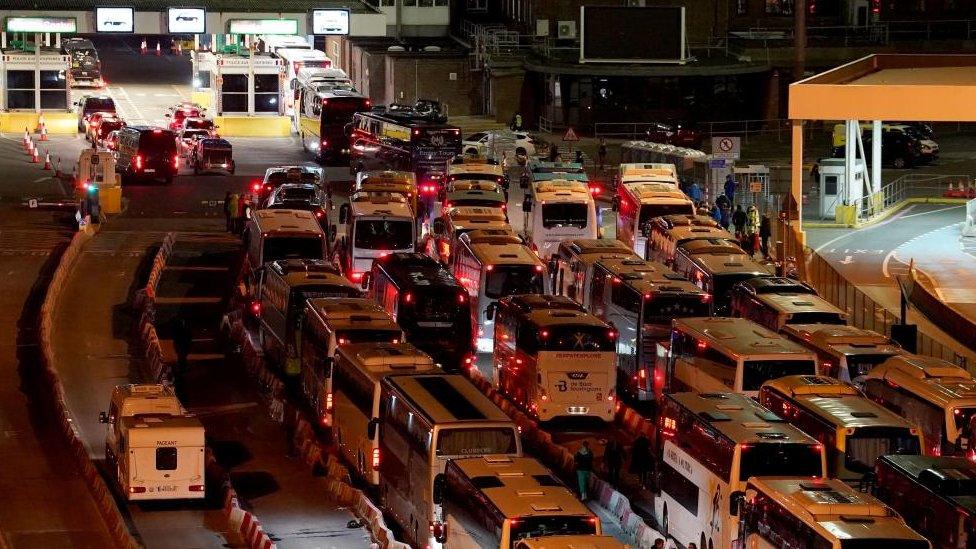Easter travel: Train and ferry queues as millions head on getaway
- Published
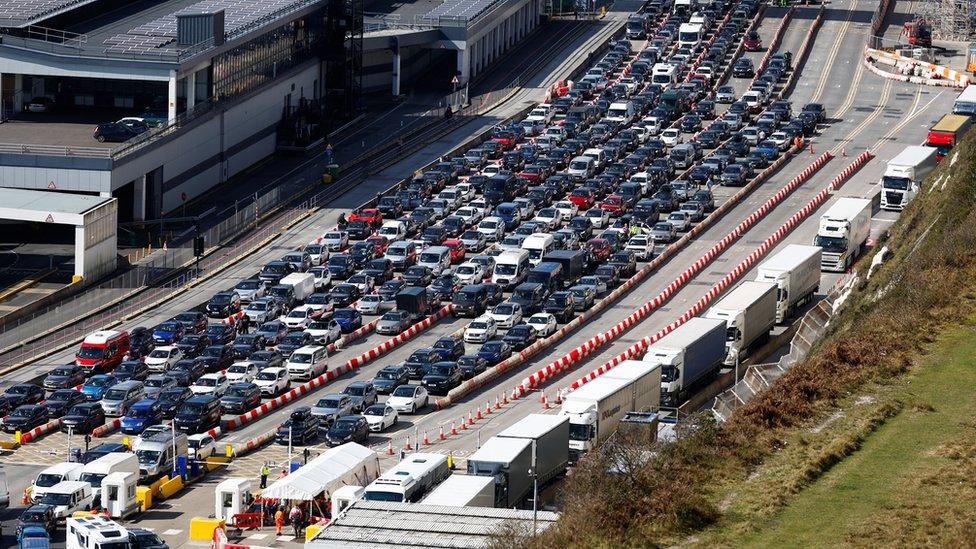
Cars and lorries queue to check in for ferry departures at the Port of Dover
Millions of people have headed off on Easter trips, as transport companies warn them to expect delays.
Holidaymakers at the Port of Dover - which saw delays of more than 14 hours last weekend - only queued for 60 to 90 minutes.
The country's roads were expected to hit their peak on Saturday, with around 15 million drivers.
The weather is forecast to remain dry until Monday and is not likely to cause travel problems.
The Port of Dover said on Friday freight traffic was queuing and being managed by its Traffic Assessment Project - known as Dover TAP - after "free flowing" overnight.
The temporary traffic management system imposes a 40mph (64km) speed restriction for all vehicles approaching Dover from the west via the A20.
By 12:00 BST, around 500 lorries were being queued on the outskirts of the town to try to stop the port becoming gridlocked.
The Kent Resilience Forum - tasked with keeping the roads running in the county - said Dover was "very, very busy" but added the situation was under control.
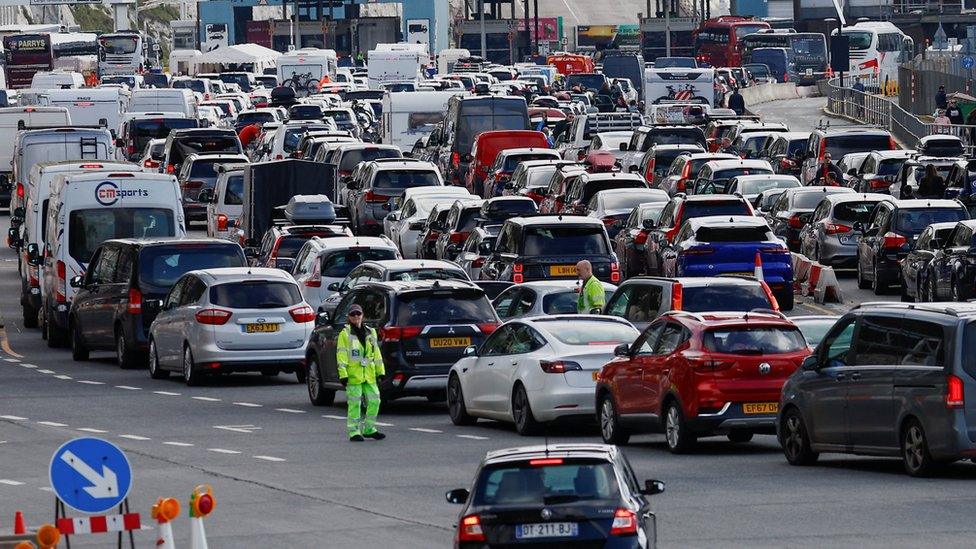
Drivers face waits of up to 90 minutes in Dover
The port had said earlier that extra measures were in place to cope with the increased demand, including opening up new areas where coaches could be checked more quickly by the authorities.
Doug Bannister, chief executive of the Port of Dover, told the BBC the port had worked with ferry operators to try to spread the demand across three days instead of one. He expected Good Friday traffic to slow down in the evening.
Candice Mason, founder of Masons Coaches, told the BBC she hoped extra measures at Dover would be put in place for the rest of the peak season, not just the bank holiday weekend.
"We need to see this all through the summer season," she said, adding that last week's delays were caused by changes in the infrastructure at the port.
"We need to have our passports checked more rigorously, and there are different checks that are taking place - and really simply, last weekend in my opinion, it just wasn't staffed sufficiently," she said.
Port officials said they held an "urgent review" with ferry operators and French authorities after last week's travel problems triggered a row over the impact of Brexit on the route.
Slow processing of documentation since the UK left the EU, staffing levels on the French side of the Channel, and more coaches than expected were variously blamed for long queues at the port.
French border police blamed the Port of Dover management for the congestion last weekend, claiming they had warned the UK side that too much traffic was being allowed through.
They insisted they had manned every booth on their side "100% of the time".
A spokesperson for the French Police Nationale told the BBC it was "mathematically impossible to absorb" the amount of vehicles they were told needed processing.

At the scene
by Simon Jones, BBC correspondent, in Dover
The queues had been building inside the Port - but the mood among passengers on Friday morning was one of relief that they were not seeing the chaos the terminal experienced last week.
But there was still some trepidation as they inched towards border controls. Many arrived with plenty of food, drink and entertainment in case they do get stuck.
The police were out in force on the roads leading to the port, regulating the flow of traffic inside, which seemed to prevent the gridlock the town suffered last Saturday.
The authorities are convinced they are better prepared than last weekend.

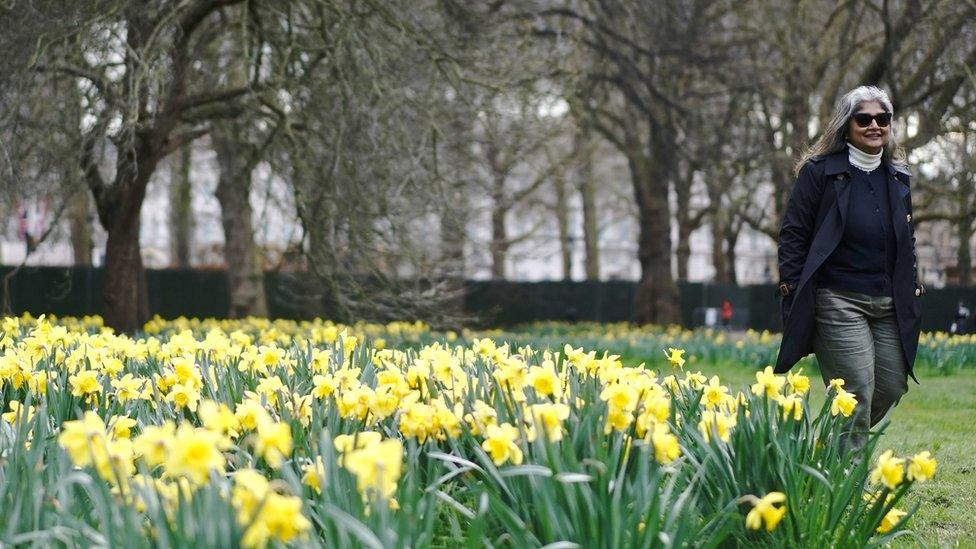
The UK is expected to see settled weather for most of the Easter weekend
The weather is not expected to lead to travel woes over the weekend, with conditions forecast to remain largely dry until Monday.
Gemma Plumb, BBC Weather Forecaster, said Friday would be "dry and fine for most of the UK with sunshine", although there would be cloud in some eastern parts of the country.
Most of the sunshine over the weekend is expected in western parts, before rain hits some parts of the country on Monday.
The AA, the British motoring association, said it expected Saturday to be the busiest day on the country's roads, with about 15 million drivers planning to use their cars. The RAC said it expected Friday and Sunday to be the busiest days, but there was "always the chance of a boost in traffic if the weather forecast turns out better than expected".
Congestion is expected on the M25, the M4 Wales heading into Newport, the M6/M5 interchange in Birmingham as well as the M4/M5 in Bristol.
Tony Rich, from the AA, urged drivers to conduct checks on their cars before they travel, saying many of the callouts it gets were "easily preventable".
"We've put more patrols on duty, but drivers can help themselves and everyone else by doing the simple checks as breakdowns cause traffic jams," he said.
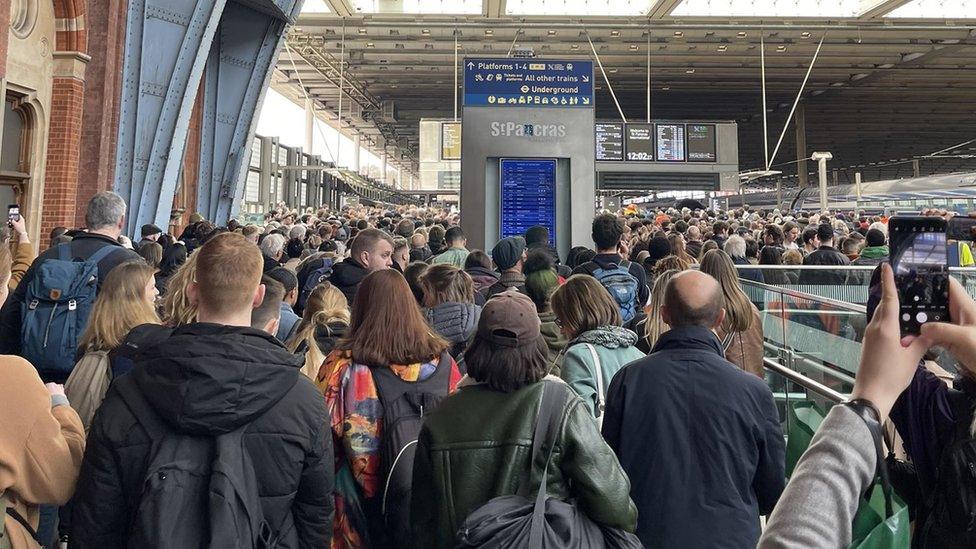
Passengers headed to St Pancras to head out of the capital after London Euston closed for engineering work
The disruption has also extended to the country's railways, with some engineering work planned over the weekend, including at London's Euston Station - one of London's main rail hubs - which will be closed from Friday until Monday due to planned upgrades.
At St Pancras station in London, Sophie Earish, a student from Wembley Park, said the queues to get on trains were chaotic and writer Ruaridh Pritchard described the situation as "mayhem".
He said staff were doing their best "under the circumstances" but added that with "lots of people arguing and pushing - it was like the last train out of Saigon".

Are you at Dover? How are you coping with the delays? Share your experiences by emailing haveyoursay@bbc.co.uk, external.
Please include a contact number if you are willing to speak to a BBC journalist. You can also get in touch in the following ways:
WhatsApp: +44 7756 165803
Tweet: @BBC_HaveYourSay, external
Please read our terms & conditions and privacy policy
If you are reading this page and can't see the form you will need to visit the mobile version of the BBC website to submit your question or comment or you can email us at HaveYourSay@bbc.co.uk, external. Please include your name, age and location with any submission.
Related topics
- Published3 April 2023
